Winner Medals
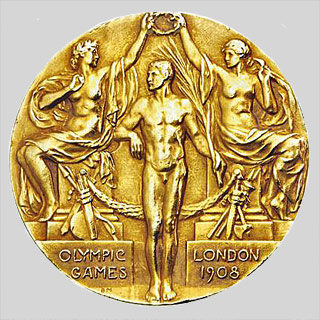
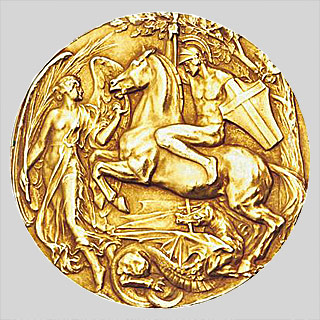
| 1st Place: | Gold Medal | Material: | Gold |
|---|---|---|---|
| Weight | 25 gr | ||
| 2nd Place: | Silver Medal | Material: | Silver |
| Weight | 19 gr | ||
| 3rd Place: | Bronze Medal | Material: | Bronze |
| Weight | 19 gr | ||
| Diameter: | 33 mm | Design by: | Bertram Mac-Kennal |
| Mint: | Vaughton & Sons | ||
| Thickness: | 2 mm | Ribbon: | None |
| Obverse: | Two young women are depicted crowning an athlete with alaurel wreath. | ||
| Reverse: | St. George, patron Saint of England, slaying the dragon. | ||
| Numbers of Medals: | Gold: 250 Silver: 260 Bronze: 260 | ||
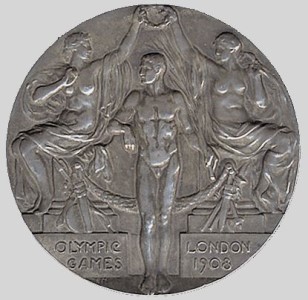
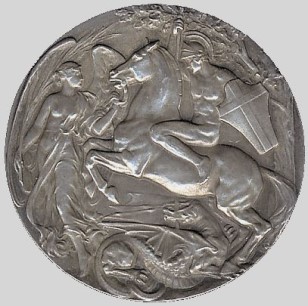
Images copyright © by Ulf Ström, Stockholm, Sweden
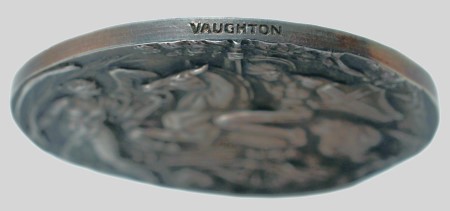
Image copyright © by www.rrauction.com
Two sets of Medals were providet, the first
(in gold, silver, and bronze) for winners of first, second, and third prizes
in Olympic events; the second (in silver-gilt, silver, bronze, and metal)
were called Commemoration Medals, one being given to each competitor with
his competitor`s badge, but the three higher classes being reserved for
officials and other who did not compete. 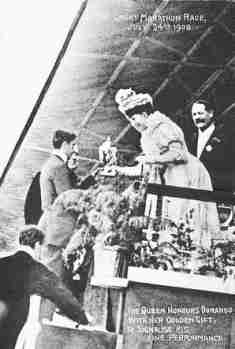 The Art Committee, to whom the organisation
of prizes and awards was entrusted, was composed of Mr. T. A. Cook and
Mr. G. S. Robertson (members of the British Olympic Council), who were
fortunate enough to obtain, in the preliminary stages of their work, the
valuable assistance and advice of Mr. Thomas Brock, R.A., and Mr. A. S.
Cope, A.R.A. 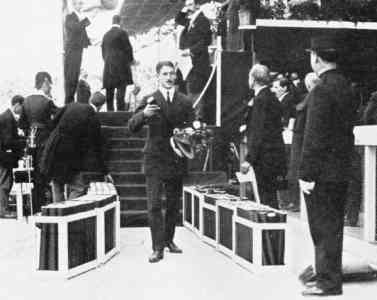 The olympic victory ceremony 1908 (with diploma)
The commission for designing both kinds of medals was given to Mr. Bertram Mackennal, A.R.A., who also kindly gave the Council designs for the various official badges. (Source document: Official
Report 1908, page 41 / 42) |
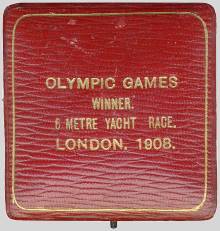 Stockholm, Sweden
For the Prize Medal the figure of St. George for England represented the Games of 1908. The athlete, crowned between two emblematic female figures, was designed to from a permanent side of the Olympic Prize Medal in all future meetings. The name of the champion and of his sport will be incised upon the rim. In the team competitions the presentation of medals was regulated as follows: - rowing, football, hockey, polo: - gymnastics: - yacht racing: A commemorative medal, in gold, was also given to the owners of the
winning yachts. Furthermore, in the 12 m and 15 m classes, a gold medal was given to the mate or the leading hand of the winning crew and a silver medal to the mate of the crew in second place. (Source document: Olympic Review, 1972) |
N.B.
(a)
(b)
(c)
(d)
(e)
I. All Awards except Gold Medals.
As the Prize-giving involves five separate Divisions of Prize-Winners,
it is essential that the following instructions should be strictly
observed :
The holder of a prize ticket must walk up to receive his prize between
two flags of the same colour as his ticket, or he will not obtain the award
to which he is entitled.
He will only receive his prize in exchange for his ticket, which will be
handed to the official instructed to ask for it.
The number on his ticket not only indicates the exact prize won by its
holder, but also shows the order of the place he must take in the pro-
cession allotted to prizes of that kind.
Team Prizes will be taken by the Captain.
Challenge Cups will be given in the Red Division after the Gold Medals
have been distributed.
Dark Blue Vouchers = Second Prize.
Yellow Vouchers = Third Prize.
Light Blue Vouchers = Diploma of Merit.
Green Vouchers = Commemorative Medals.
2.10
2.15
2.25
2.30
A
B
C
D
4.0
4.15
5.15
5.20
5.30
All winners of second and third prizes and of diplomas of merit, and all recipients of the special green cards for commemorative medals, will assemble on the east side of the Stadium, on the cycle track, opposite Block MM, and between Rooms 11 and 12.
The Band of the Grenadier Guards will play the National Anthems of all the foreign countries represented.
The Drums and Fifes of the Irish Guards will play the “Advance,” followed by a march.
The prize-winners mentioned above will advance across the grass to the cinder-path at the south-west comer of the Stadium, and from there along the cycle track to their respective prize tables, which will be arranged as follows, counting outwards from the Royal Box :
— Second-prize winners, holding dark-blue tickets, will advance between the dark-blue flags to the table of the same colour, at which Her Grace the Duchess of Rutland will distribute the silver medals, assisted by Mr. Sutherland, Mr. Fisher, and Mr. Boulger, members of the British Olympic Council, as her marshals.
Third-prize winners, holding yellow tickets, will advance between the yellow flags to the table of the same colour, at which Katharine Duchess of Westminster will distribute the bronze medals, assisted by Mr. Syers, Mr. Biedermann, and Mr. Hawes, members of the British Olympic Council, as her marshals.
Winners of diplomas of special merit will advance between the light- blue flags to the table of the same colour, at which the Duchess of Westminster will distribute the diplomas, assisted by Mr. Henry, Mr. Benjamin, and Mr. Richardson, members of the British Olympic Council, as her marshals.
Recipients of the special commemorative medals will advance between the green flags to the table of the same colour, at which the Lady Desborough will distribute the medals, assisted by Mr. Blair, member of the British Olympic Council, and Mr. Vaughton, as her marshals. The Drums and Bugles of the Irish Guards will sound the “Advance” as each of these processions start. The Band of the Grenadier Guards will play the National Folk Songs during the first part of the prize-giving.
When the National Anthem announcing the arrival of the Queen has begun, the winners of all first prizes will have been drawn up along the east side of the Stadium, opposite Block MM, on the concrete cycle track, between Rooms 11 and 12.
Immediately the 1,600 Metre Relay Race is over, the Band of the Grenadier Guards will play “See, the Conquering Hero Comes!” and the procession of first-prize winners will form up on the two tracks and cross the grass to the south-west comer of the arena, and when the Drums and Bugles of the Irish Guards have sounded the “Advance,” they will advance to the platform on the cycle track, beneath the Royal Box, where they receive the gold medals from Her Majesty the Queen, who will be attended by Lord Desborough, the members of the International Olympic Committee, the members of the British Olympic Council, and others.
On descending from the platform in front of the Royal Box, the winners receive their diplomas from Mr. George C. Drinkwater, O.U.B.C., and Mr. C. K. Philips, O.U.B.C., acting as marshals, with a sprig of oak-leaves from Windsor Forest, graciously sent by His Majesty the King, which will be handed to them by Lieutenant Norman Leith Hay Clark, Lincolnshire Regiment, acting as marshal, each sprig being tied with the Union Jack.
Her Majesty the Queen will then present her Gold Cup to Dorando Pietri.
Her Majesty the Queen will then present the following Challenge Cups to their winners, assisted by Mr. George Stuart Robertson and Mr. Theodore A. Cook, members of the British Olympic Council, as her marshals :
The Greek Trophy for the Marathon Race.
The Prague Trophy for Gymnastics.
The Montgomery Statuette for Discus.
The Prince of Wales’ Cup for Cycling.
The Hurlingham Club Trophy for Polo.
The Gold and Silversmiths’ Cup for Wrestling.
Lord Westbury’s Cup for Clay Bird Shooting.
The British Fencers’ International Challenge Cup for Epée Teams. Winners of the Challenge Cups and Captains of the winning teams, accom- panied by their teams, will advance to receive their cups at the signal of three bugles from the Irish Guards.
The Drums and Bugles of the Irish Guards will sound after the last cup has been given ; and prize-winners, having formed in line on the running- track in front of the Royal Box, will give three cheers for the Queen at a signal from Lord Desborough, after which the Band of the Grenadier Guards will play the National Anthem.